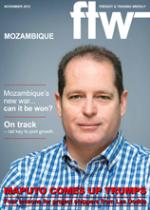Mitsui OSK Lines has
become the biggest user
of the port of Maputo
following the line’s decision to
use the port as a transhipment
hub for its pure car carrier (PCC)
southern Africa operations, and
to use larger container vessels.
“We recently upgraded our
container vessels from 2100
to 2800 TEUs, and in October
2011 commenced using Maputo
as a transhipment hub for PCC
vessels due to lack of space
and congestion in the Durban
Car Terminal,” says Richard
Purchase, MOL’s owner’s
representative who has been
based in Maputo for the past
three years.
MOL’s liner service is hubbed
out of Singapore.
The vehicle hub is used for the
transhipment of second-hand and
new vehicles to the west and east
coasts of Africa.
Cars are imported from
Singapore, Japan and Dubai,
where large numbers of vehicles
are stored in the desert before
being sold into the African and
other markets.
Maputo currently has capacity
to help South African shippers
avoid the delays in Durban due
to the upgrading of the port, he
says.
“The citrus-growing areas
of Mpumalanga, Limpopo and
Swaziland are much closer
to Maputo than Durban, but
most shippers still prefer to use
Durban, despite the congestion,
due to perceived higher costs and
tradition,” he says.
Overall container import
volumes for the port are down by
15% mainly due to a decline in
cement imports as local factories
came on line.
“Currently there is very little
or no transit cargo into SA,
Swaziland or Zimbabwe due
to the Customs bond that is
required.
“Shippers are advised to
monitor the situation as this
matter is currently being
negotiated, and we are all hoping
for resolution and withdrawal
of this requirement in the near
future,” he says.
MOL is carrying increasing
volumes of cargo bound for
Mozambique itself – a reflection
of economic growth in the
country.
Containerised imported cargo
includes rice, constructionrelated
cargo, used clothing, used
vehicles, manufactured goods
and foodstuffs.
Exports – which have also
declined – are made up of a
mixed bag of chrome, timber
and citrus out of South Africa;
scrap metal and frozen fish from
Mozambique; citrus, sugar and
timber from Swaziland; and
chrome from Zimbabwe.
MOL and other members of
the Maputo Shippers’ Forum
are working with the port
authorities and terminal operators
in order to attract more cargo by
reducing costs.
CAPTION
Richard Purchase ... ‘Maputo currently
has capacity to help South African
shippers avoid the delays in Durban.’

